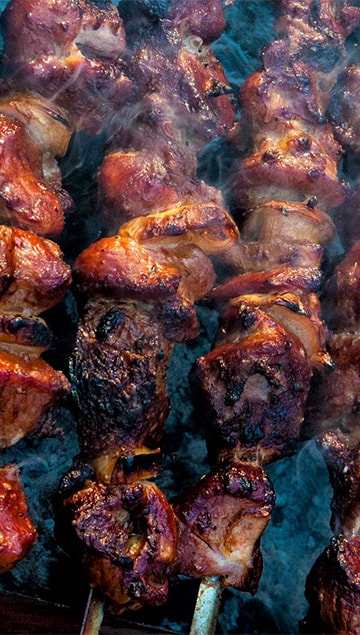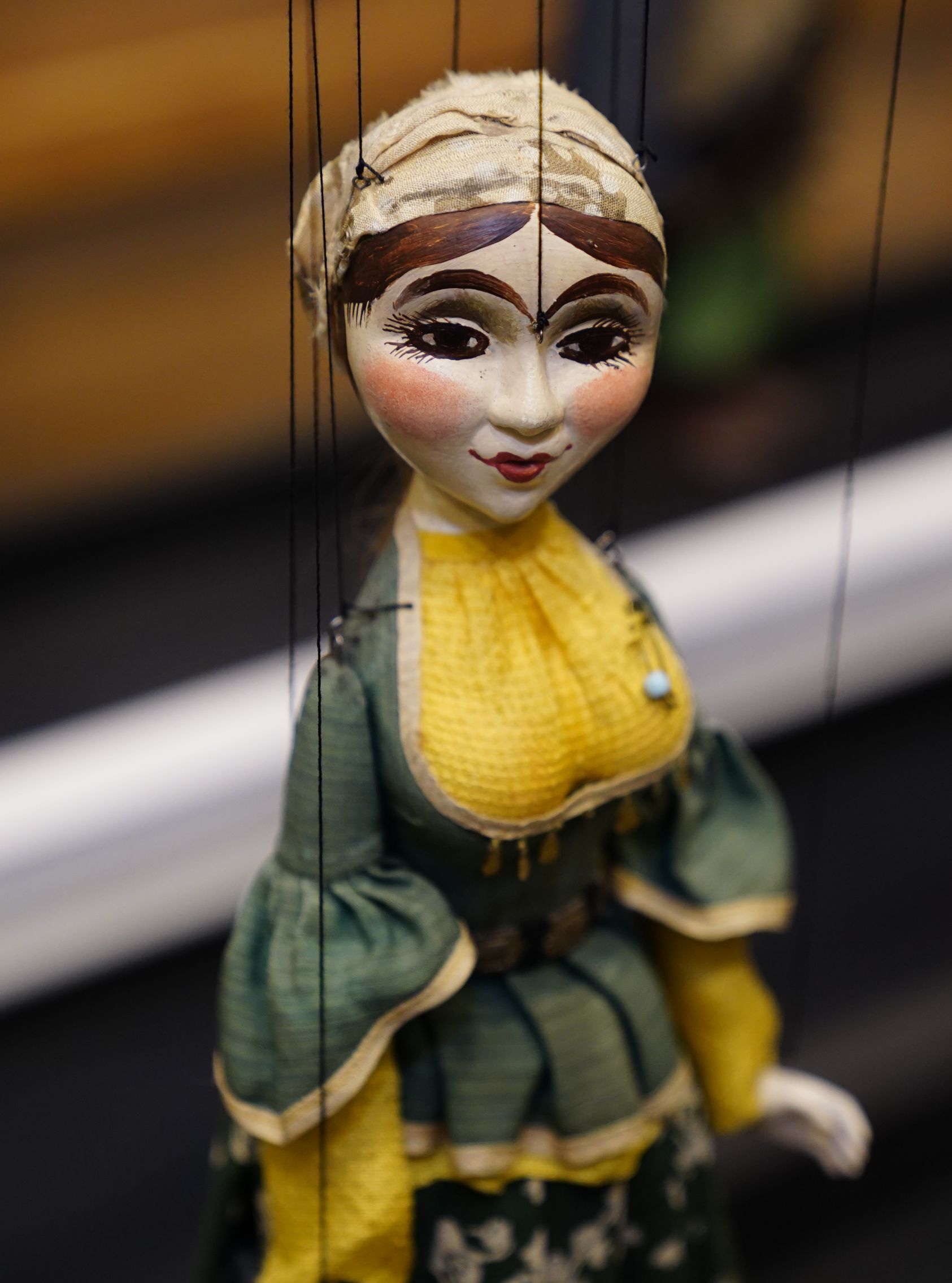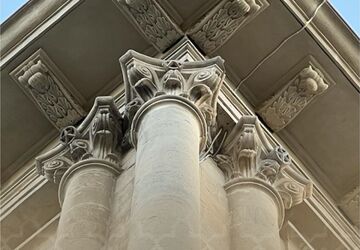Even if you have limited time for cultural activities in Baku, you should make sure to visit the Marionette Theatre. Here you get the chance to come in touch, in a short period of time, with the full range of the Azerbaijani people’s cultural heritage: architecture, music, traditional costumes, the melodies of Azeri speech, daily life and holidays, ornaments and dances...
The modern here originates from the ancient, the classic links to the contemporary, tradition ties to innovation, the East flows into the West... The Theatre’s magic results from various influences including the theatre building, the shows staged, and every person related to the Theatre’s life.
By now two plays by Uzeyir Hajibeyli have been staged in the theatre: “Arshin Mal Alan” (musical, 1913/1990) and “Leyli & Majnun” (opera, 1908/2016). in the future the theatre will expand its repertoire by adding other plays which present and promote the creative heritage of U.Hajibeyli, known as the founder of Azerbaijan’s classical music, a great composer and playwright, a prominent folklorist and educator. This approach showcases the conceptual idea of Tarlan Gorchu – the theatre’s founder and director.
An endless power of love can be heard from every single tune composed by the great Hajibeyli and can be observed in each of our marionettes and stage sets, as well as in every movement of our puppeteers. Thus our shows are remarkably clear and attractive for speakers of any language and spectators of all ages, origins and outlooks.
The Baku Marionette Theatre is located in the Old City – a unique historical and architectural complex of the medieval Baku fortress. The fortress area is called Icherisheher (literally translated as ‘The Inner Town’). This is the cultural and historical heart of the capital and perhaps of the whole of Azerbaijan.
The building was erected in 1880 in the neoclassical style. Initially it was the property of the Salimkhanovs, a prominent trader family in Baku. During the Soviet period this building was included into the city’s residential resources. A large fire later damaged the building for many years. Then in 1986 city authorities ordered it restored for the Marionette Theatre, but the endless financial problems of the stagnation period followed by post-Soviet transition difficulties didn’t allow the idea of a new theatre to come true as it had been planned...
Everything changed in 2013 when the Baku Marionette Theatre became one of the cultural objects under the umbrella of the Administration of State Historical-Architectural Reserve "Icherisheher" under the Cabinet of Ministres of Azerbaijan. Almost immediately the Icherisheher Administration managed to find the resources for a high quality restoration/reconstruction of the theatre building. It was possible due to the kind support of the First Lady of Azerbaijan, First Vice-president of Azerbaijan, Mrs. Mehriban Aliyeva. By the year 2016 construction was complete and for the first time in its history the Theatre obtained its permanent address at 20, Muslum Magomayev Street.
On December 24, 2016, the Baku Marionet Theatre launch ceremony was held. On that celebration day the President of Azerbaijan, Mr. Ilham Aliyev, and Mrs. Mehriban Aliyeva visited the Theatre and participated in its opening ceremony. The guests wished the team successful creative work in the newly opened theatre building.
"Arshin Mal Alan"
(‘The Cloth-Peddler’)
Marionette Show in 12 Scenes
Based on Oriental musical of the Year 1913, by Uzeyir Hajibeyli
The show created in 1985–1990
Soundtrack recorded in 1988
‘Arshin Mal Alan’ is the third and thus the last musical by Uzeyir Hajibeyli. It was staged and loved in many countries around the world. The story itself was taken from the real life of the famous mugham singer Majid-bey:
The young man Asker is the son of one of the most respected merchants of the town. Asker wants to marry, but he will never agree to do it without seeing and loving the girl, while that is not allowed by tradition. Aiming to make it proper both for him and the public, Asker applies a helpful trick: he changes his appearance, pretending to look like a cloth-peddler and touring the streets and yards in search of the girl of his heart. And his adventures are endless.
Stage Director – Tarlan Gorchu
Art Directors – Elchin Mammadov, Tarlan Gorchu
Music Adaptation by – Javanshir Guliyev
Puppets’ Craftsmen – Elman Mirzayev, Shamil Buksayev, Irma Kaadze, Elmira Abbasli
Sets’ Craftsmen – Abas-Ali Mustafayev, Elman Mirzayev, Tarlan Gorchu, Zeynab Kaadze
Cast of Characters / Singers & Actors Recorded:
Asker, a young, rich merchant – Ilgar Muradov (vocal), Fuzuli Huseynov (dialogues)
Jahan-khala, Asker’s aunt – Zarnigar Aghakishiyeva (vocal & dialogues)
Suleyman, Asker’s friend – Elkhan Ahadzadeh (vocal), Ramiz Melikov (dialogues)
Veli, Asker’s servant – Yasin Garayev (vocal & dialogues)
Sultan-bek, an old, poor aristocrat, a widower – Siyavush Aslan (vocal & dialogues)
Gulchohra, Sultan-bek’s daughter – Khuraman Gasimova (vocal), Malahat Abbasova (dialogues)
Asya, Gulchohra’s cousin – Najiba Huseynova (vocal & dialogues)
Telli, Gulchohra’s maidservant – Nuriya Ahmadova (vocal & dialogues)
Puppeteers:
Ali Allahverdiyev / Mehman Musabeyli
Sabuhi Yagubov / Hasan Yagubov
Zaur Mammadov / Hikmet Aydinoghlu
Nazim Huseynov / Ilgar Rasulov
Ramiz Aliyev, Rizvan Alasgar
THE PLOT:
THE FIRST PART
Scene 1: Asker’s mansion
Asker is melancholy, wondering how he will ever find true love and marry. “I won’t marry any girl unless I have seen her and fallen in love with her first.” “But nobody will let you see their daughter before the wedding ceremony. That’s the custom”, his aunt tells him. Suleyman, Asker’s friend comes up with an idea: “Take an arshin (a metre ruler) and roam around the streets as a cloth-seller, welcomed at any place. You will then be able to meet the girl of your dreams.”
Scene 2: Streets of Baku
Asker has been roaming the streets for some days – but in vain. Suddenly he is accosted by two thieves who demand money... The fools end up bargaining with each other appropriate amount to take. But they bargain down not up! Finally, scared to death, Asker leaps up and away over the nearby wall.
Scene 3: Sultan-bek’s orchard
Gulchohra is sitting in the beautiful orchard. She too is feeling melancholy: she will never agree to marry blindly. Neither Asya, her cousin, nor Telli, her maidservant, can convince her otherwise. Suddenly a cloth-seller (Asker) lands in the orchard, right by the fountain. The moment he sees Gulchohra he falls in love. The moment she sees Asker, she too falls in love. They joyfully sing. Love is in the air...
Scene 4: Streets of Baku
Asker returns home, overjoyed. He is happy indeed. His faithful servant Veli celebrates the moment along with Asker. They both are happy for at last Asker has found his true love.
Scene 5: Sultan-bek’s orchard
Asker brings his aunt to the place where Gulchohra lives. When Sultan-bek meets Jahan-Khala he immediately falls in love with her and talks of marrying her. Asker comes out of his hiding to declare... “Oh, dear bek, let’s become relatives twice over: I’ll give you my Aunt and you let me marry your daughter.” “You rascal!” Sultan-bek furiously exclaims. “My daughter shall never become the wife of a beggar! Go away!”
I N T E R V A L
THE SECOND PART
Scene 6: Sultan-bek’s mansion
Suleyman meets Sultan-bek to propose his friend Asker as a husband for Gulchohra. Sultan-bek agrees, knowing Asker’s reputation in the city as an honourable rich young merchant. During that matchmaking visit Suleyman and Asya occasionally meet here each other and feel mutual attraction...
Scene 7: The street in front of Sultan-bek’s mansion
Whilst the marriage of Asker and Gulchohra is being discussed inside Sultan-bek’s mansion, Asker’s merchant Veli there outside finds a love for himself: Telli, Gulchohra’s maidservant. Telli is inclined to accept his offer and wonders repeatedly if Veli has a lot of money. Veli also repeatedly replies: “Yes, I do! Yes, I have!”
Scene 8: Sultan-bek’s mansion
Sultan-bek tells his daughter that he has decided she should marry Asker – a rich young merchant. Gulchohra despairs. “Father, I love only the cloth-seller. I’ll marry no-one but him.” The furious Sultan-Bek threatens to kill his daughter and everyone in the house.
Scene 9: The street in front of Sultan-bek’s mansion
However, Sultan-bek realises the only solution is to allow Asker’ men to kidnap Gulchochra during the night. Then she will have no option besides becoming Asker’s wife.
Scene 10: Beautiful room
Gulchohra finds herself beneath a crystal chandelier in a strange room. She is distraught. “They want me to marry the merchant, Asker. I would rather hang myself than agree to marry him.” Asker enters the room and in that instant Gulchohra recognises that he and the cloth-seller are one and the same person.
Scene 11: Room with mirrors
Asker then explains the reason for the disguise. “We have now four weddings to celebrate at the same time.” Asker marries Gulchohra, Sultan-bek marries Cahan, Suleyman marries Asya, and Veli marries Telli.
Scene 12: Final scene
Asker and Gulchohra fly up and away in their balloon – their romantic honeymoon starts.
By the way, in a few days the Paris seasons will begin. So, to Paris! To Paris!
Leyli & Majnun’
Marionette Show in 14 Scenes
Mugham Opera
The opera was written by Uzeyir Hajibeyli in 1907, based on the poem of the same title by Muhammad Fuzuli (1494–1556)
The show created in 2013–2016
Soundtrack recorded in 2015
This is the first opera created in Azerbaijan and in the Middle East in general. Uzeyir-bey composed it based on extremely rich folklore materials including mughams and lyrical songs. At the same time, it contains both Oriental and European musical traditions interwoven with each other. Combined with a popular, classical story, its unique musical solution made this opera beloved not only in Azerbaijan but in many other nations as well.
‘Leyli & Majnun’ is the ancient legend of a delicate love story and endless fidelity. Its roots are in Arabian folklore, but it has been embraced by the entire Oriental world. Young Leyli and Majnun, the protagonists of this tragic and poetic love story, find their direct analogies in classic European literary tradition: Tristan and Iseult, Romeo and Juliet, etc.
Stage Director – Tarlan Gorchu
Art Director – Tarlan Gorchu
Music Adaptation – Salman Gambarov
Puppet Craftsman – Tengiz Khalvashi
Light Director – Azer Mukhtarov
Stage Mechanisms – Ilkin Mirzayev
Cast of Characters / Singers Recorded:
Leyli – Gunay Imamverdiyeva
Geys / Majnun – Mansum Ibrahimov
Leyli’s Father – Jabir Hasanov
Majnun’s Father – Elgiz Aliyev
Majnun’s Mother – Gizilgul Babayeva
Nofel, friend of Majnun – Jahangir Gurbanov
Maurus, friend of Nofel – Elgiz Aliyev
Ibn-Salam – Ramiq Bayramov
Instrumental performers of mugham:
Rashad Ibrahimov (tar)
Tabriz Yusubov (kamancha)
Actors-Puppeteers:
Fariza Babayeva
Ali Allahverdiyev
Aysel Badalova
Tatiana Terentyeva
Nazim Huseynov
Nasrin Vusal
Hikmet Aydinoghlu
THE PLOT
1. Moon in the Skies
This millstone grinds the starts and their endings.
It breathes infinity—the secrets of existence.
2. Fairies
The thread of life is thin and candle’s light is dim,
But throbbing love contains the Earth, the Skies and Oceans...
3. Declaration of love
Leyli: My lips refuse to hide my heart’s confession...
Geys: You are my breath! The world is only you!..
4. Geys with his parents
Geys: My mind turns dark as I am stricken with love...
Parents: We’ll ask the father of Leyli to give his consent!
5. Leyli’s father rejects their marriage proposal for Leyli
Geys’ Father: Bestow your blessings – give Leyli to Geys...
Leyli’s Father: No, I will not. He is “majnun” – a madman!
6. Hopeless sweethearts
No mercy! Separated! Look, oh Moon!
Now Geys, indeed, will turn into Majnun...
7. Ibn-Salam’s marriage proposal visit
Leyli’s Father: You’ve got your aim, I give her, I agree...
Ibn-Salam: Then since today you are my dearest father!
8. Majnun buries his head in the desert
Majnun: My fate is now at enmity with me.
It offers me no hope and no relief...
9. Nofel meets Majnun
Maurus: Your friend was parted from Leyli and, thus, went mad.
Nofel: I’ll solve it with my gold or with my weapons!
10. Battle for Leyli
Nofel: Show mercy, give Leyli to her beloved Majnun!
Leyli’s Father: Neither your pearls nor arms can persuade me!
11. Ibn-Salam’s residence
Leyli: Please, give me time; his love still dwells inside me.
Ibn-Salam: Oh, yes, I‘ll wait. Don’t worry, I have patience!
12. Refusing to yield to her fate, Leyli dies...
Leyli: My sorrow is unbearable. I have no hope.
And this despair has burned my heart to ash...
13. Majnun’s death
Majnun: My God! I need no longer this my life!
No longer do I need a world without Leyli!
14. Final Scene
These two, young souls, two spirits will forever
be joined by Love that bound them together...



















